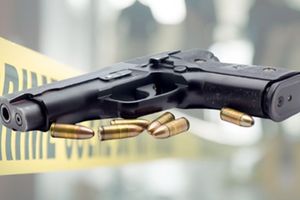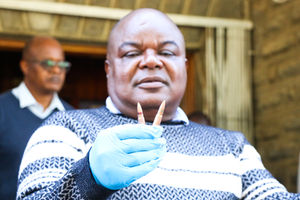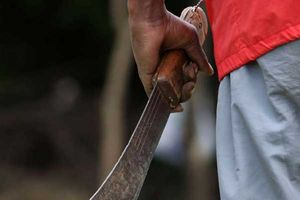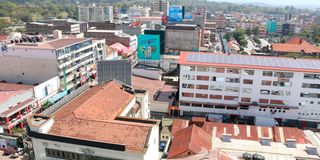
An aerial view of a section of Nakuru City.
Ms Mary Muthoni is an established businesswoman in Nakuru City running several mobile money transfer agencies.
Recently, she enhanced the security features in all her shops by barricading the cashiers from clients with grills and opaque glass at the counters.
Asked why she opted to reinforce her businesses, Ms Muthoni said it was due to rising robbery cases in Nakuru. She also adheres to a strict schedule for opening and closing her shops.
“In the past, I was a victim of an armed robbery and I know very well the extent to which they can go just to steal. I lost more than Sh500,000 last year,” Ms Muthoni said.
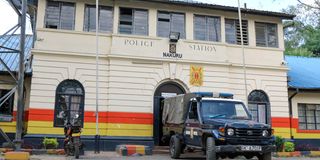
Central Police Station in Nakuru City.
From the infamous Confirm gang to other emerging splinter gangs, serial killings and violent robberies have turned the once calm region into a haven for criminals wreaking havoc on residents.
When darkness falls, some parts of Nakuru City and the larger county become no-go zones. Sometimes, not even police presence can deter the criminals.
Taxi drivers are among the most fearful residents as some have been attacked and others killed and others seriously injured by thugs.
Recent murders such as that of Molo activist Richard Otieno, 22-year-old mechanic Wanjiru Ng’ang’a in Subukia, a Naivasha supermarket employee, and Maxwell Ndumia, a minor in Barnabas—cast a dark shadow over the county’s safety.
Elburgon, Molo, Kuresoi South, Kuresoi North, and Naivasha have become Nakuru’s unofficial capitals of crime and horror.
A 2025 survey by the Kenya National Bureau of Statistics ranks Nakuru as the fourth most insecure place in the country after Nairobi, Kiambu and Meru. The report released on May 6 indicates that Nakuru is becoming one of the most dangerous places to live.
In 2024, Nairobi recorded the highest number of reported crimes at 9,717, followed by Kiambu with 8,865 and Meru with 5,487. Nakuru reported 4,664 crimes in the same period.
Data shows crime has steadily risen in Nakuru over the last five years. In 2020, 3,492 crimes were reported, increasing to 4,281 in 2021 and 4,514 in 2022. In 2023, cases rose to 5,072. Although there was a slight decline to 4,664 in 2024, the region remains under the grip of criminal gangs.
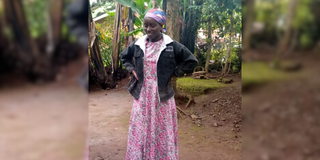
Wanjiru Ng'ang'a, 20, a mechanic at Kiboronjo area in Subukia, Nakuru County, who was killed by unknown assailants on Good Friday while returning home after work.
According to governance expert David Ngugi, Nakuru's elevation to city status has contributed to the crime surge due to population growth.
“The upgrade has led to increased population and crime. Gangs from areas like Nairobi and Kiambu may have moved into Nakuru to exploit new opportunities. Police, the public, and other stakeholders must adopt a multifaceted and collective approach to curb crime,” Mr Ngugi said.
In the past month, a wave of violent crimes has hit Nakuru sparking fears of a resurgence of criminal gangs. In response, the National Police Service has formed a special crime-busting unit with officers from Nairobi to contain the situation.
Six people, including a police officer, have been killed by armed robbers. Victims include businessman Jackson Mwangi from Nakuru's Pipeline area who was shot on May 21 and trader Paul Ndung’u, murdered in Bahati. Most attacks have targeted M-Pesa shops, with gangsters fleeing on motorcycles.
The most shocking incident occurred on June 1, when armed thugs ambushed police officers on patrol in Freehold, killing Constable Josephat Ruto and seriously injuring two others.
Preliminary investigations by the Directorate of Criminal Investigations (DCI) have linked the crimes to the outlawed Confirm gang.
“Our investigations indicate that some of the criminals belong to the Confirm gang. We’re working to stop the re-emergence of such groups,” said a senior detective who requested anonymity.
The Confirm gang, outlawed in December 2016 by then-Interior CS Joseph Nkaissery, began as a group of youth swindling residents via mobile money fraud, muggings, and robberies. It has since evolved into a violent gang.
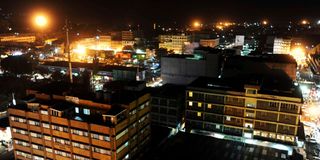
A nighttime aerial view of a section of Nakuru city.
Police say the gang is often armed with pangas, metal rods, swords, and guns. Despite frequent crackdowns and arrests, it has resurfaced multiple times.
In 2022, a major crackdown sanctioned by former Interior CS Fred Matiang’i temporarily forced them out of Nakuru.
Other gangs reportedly regrouping include Mauki, Wa TZ, Eastlando, Nyuki, Gaza, Msafi and Dragon. A senior police officer confirmed that some previously dismantled cells are attempting to reorganize.
“We have seen efforts to regroup, but we won’t allow it. We are determined to eliminate them,” he said.
Investigations by the Daily Nation show these gangs have partnered with others from Nairobi and Kiambu and are responsible for recent robberies, carjackings and assaults using guns and other weapons.
The Confirm gang previously operated in slums such as Kivumbini, Lake View, Kwa Rhoda, Kaptembwa, Flamingo and Bondeni. It has now spread to new areas and recruited more members, particularly from Nakuru East and West.
An interview with a 14-year-old gang member revealed that minors aged 13 to 18 are increasingly joining gangs, often dropping out of school due to poverty and peer influence.
“I dropped out in Class 8. My schoolmates who had money introduced me to the gang,” said the boy.
Panga-wielding gang
A 15-year-old said he joined the Gaza gang to support his sick mother and confirmed that at least 10 minors have recently joined gangs.
The boys expressed a willingness to reform if someone could help them return to school. However, the County Children’s Department lacks records of these minors, meaning such cases go untracked.
Some residents believe the gangs have ties to local politicians.
“Politicians protect them. When arrested, they are bailed out and during elections, they drum up support for their political sponsors,” said a resident.
In Bondeni, Flamingo and Lake View, residents say a panga-wielding gang has been terrorising people for years, well before the latest crime wave.
“No one is spared, not even police officers. The gangs have become daring and now have guns,” said Miriam Murigi, a Bondeni resident.
“These gangs have always been part of politicians’ campaign teams. The difference now is that they are more lethal,” added John Maina of Flamingo.
Nakuru County Commissioner Loyford Kibaara admitted that gangs might be regrouping.
Re-emergence of criminal gang
“We are pursuing more suspects and will not allow the re-emergence of criminal gangs. Criminals have evolved from fraud to knives, and now to firearms. We will deal with them ruthlessly,” he said.
Security patrols have been intensified in Nakuru and Mr Kibaara urged residents to report gang activity to help police act swiftly.
Jesse Kariuki, who has helped reform gang members in Nakuru and Naivasha says the rise in crime is due to youth pressure to succeed amid limited opportunities.
“Peer pressure, adverse childhood experiences, drug abuse, neglect and exposure to parental criminality in slums contribute to youth crime,” he said.


